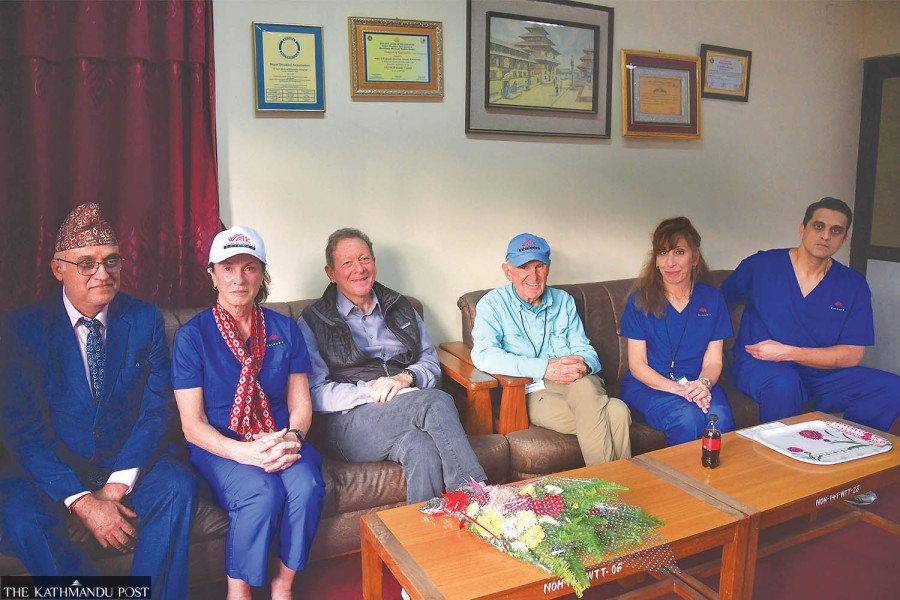National
The Pritzkers’ long journey of philanthropy in Nepal
Tom and Margot Pritzker support transformative healthcare initiatives like Operation Walk Chicago, which collaborates to provide free hip and knee replacement surgeries.
Sanskriti Pokharel
Philanthropic couple Tom Pritzker and Margot Pritzker came to Nepal 50 years ago—and they immediately fell in profound love with the country and its people.
Despite their highly successful professional backgrounds—Tom serving as the executive chairman of Hyatt Hotels Corporation and Margot as the chair of the Aspen Institute Board of Trustees—they remain humble and down-to-earth. (In 2024, Forbes put Tom Pritzerk’s net worth at $6.9 billion.)
In a brief interaction with the Post, what stood out was their warmth, simplicity, and deep-rooted values. The couple exudes a humility that belies their professional stature. Their lives, which could easily be consumed by materialistic demands, are instead guided by altruism and a commitment to giving back to the community.
Reflecting on their early experiences in Nepal, Margot, her voice tinged with emotion, recalls: “Decades ago, while trekking through the majestic mountains, we encountered many Nepali individuals suffering from debilitating illness. They struggled with back problems and joint issues that left them unable to move freely, and confined to their homes.”
The sight of such hardship touched their hearts, sparking a desire to make a difference in the lives of those they met. Since that pivotal moment, the Pritzkers have dedicated themselves to charitable endeavours aimed at improving the Nepali lives.
In 2009, Margot was having some issues with her neck and was sent to Dr Victoria Brander in Chicago for treatment.
Dr Brander, along with Dr David Stulberg, had co-founded Operation Walk Chicago in 2005, a non-profit medical humanitarian organisation dedicated to providing free hip and knee replacement surgeries.
Operation Walk Chicago’s mission is to improve the quality of life for patients from disadvantaged groups worldwide by reducing disability caused by advanced joint diseases.
“Since its inception, Operation Walk Chicago has worked extensively, travelling to numerous countries and offering life-changing treatments to countless individuals in need,” said Dr Stulberg. They have even come to Nepal and have been operating on patients here since 2009.
“The Pritzkers have been donating money to Operation Walk. We are administering it and we come to Nepal every year to operate with the local surgeons on the poor,” said Dr Brander.
During her treatment with Dr Brander, Margot became aware of the organisation’s humanitarian work, including its efforts in Nepal, a country that already held a special place in her heart. Deeply moved by their dedication and the impact they were making, Margot decided to actively support Operation Walk Chicago’s initiatives. Her involvement further deepened her connection to Nepal and reinforced her commitment to giving back to the country and its people.
Moreover, since 2009, Operation Walk Chicago has collaborated with Nepal Orthopaedic Hospital to bring much-needed care to patients in Nepal. Established in 1998, the hospital was founded as a charitable institution with a mission to provide quality orthopaedic care to those in need, especially the underprivileged.
Dhiraj Mainali, administrative chief of the hospital, said: “Since its inception, the hospital has aimed to make advanced orthopaedic treatment accessible and affordable for the people of Nepal, many of whom have been historically deprived of such medical services.”
“The hospital was designed to meet the growing demand for specialised orthopaedic care in the country. It offers a capacity of 100 beds and its core focus is to deliver high-quality care while keeping costs within the reach of the low-income population.”
The hospital’s commitment to affordability and accessibility has been a vital aspect of its healthcare delivery model. By partnering with Nepal Orthopaedic Hospital, Operation Walk Chicago has played a significant role in furthering this mission.
Pritzkers’ are providing Pritzker orthopaedic funds to support healthcare initiatives in Nepal. According to Dr Victoria Brander, this grant programme is specifically designed to address one of the most significant barriers to joint replacement surgery–the high cost of hip and knee implants. “This programme will help alleviate the financial burden for the very poor and enable them to access life-changing orthopaedic care,” Dr Brander explained.
The fund aims to make advanced medical treatments, such as hip and knee replacements, more accessible to underprivileged individuals who would otherwise be unable to afford them. “Starting in January, the programme will begin distributing grants to subsidise the cost of these essential implants and ensure that surgeries can take place at Nepal Orthopaedic Hospital,” added Dr Brander.
Ten years ago, Dr Stulberg and Dr Brander realised that for the sustainability of the treatment options they were availing in Nepal, they needed to train local surgeons. What could be better than Nepalis taking care of Nepalis!
“Teaching does not mean just sitting with a book and showing them how to do the operation. Before the case, we review the X-rays and the patient exam, and discuss what we might expect to see. Then we do the cases together. We demonstrate different techniques and approaches during the surgery. And then after the case, we once again review what we did and what we saw. That’s how we give them hands-on learning experience”, stated Ravi Bashyal, an orthopaedic surgeon based in Chicago, Illinois who also volunteers at Nepal Orthopaedic Hospital.
So the aspiring surgeons they taught in the past are now capable of doing the surgeries themselves.
Sanju Thapa, a patient at the Nepal Orthopaedic Hospital, had been having knee problems for two decades. In the hope of getting her knees treated, Thapa visited numerous hospitals but to no avail.
“When I was brought to this hospital, I got my surgery and I am at ease now. After two decades, I can finally walk properly,” says Thapa.
“This is one of the most impactful philanthropic works we are conducting in Nepal. People who never thought they could walk can now get up and walk,” Tom says. “It's life changing.”
Dr Brander agrees that Nepal Orthopaedic Hospital’s ability to do hip and knee replacement surgery is as good as anywhere. “I would totally have no trouble getting my hip replaced here.”
Bashyal said that when they do hip and knee replacement surgeries in the US, it changes an individual’s lifestyle. “But in Nepal, it saves the lives of not just an individual but of their family too. So the impact is greater here.”
Margot believed that whether it’s in healthcare, education, or provision of food, philanthropy plays a critical role. “The government should still do their job but whenever philanthropy steps into help, things get easier,” Margot said.




 14.24°C Kathmandu
14.24°C Kathmandu















